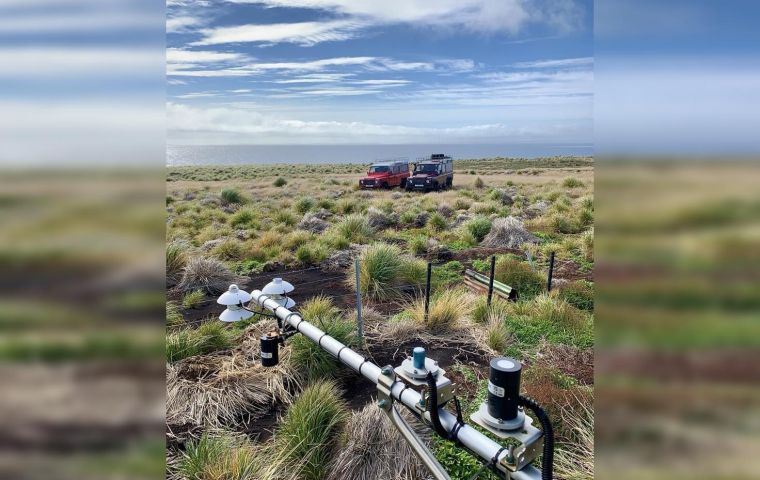MercoPress. South Atlantic News Agency
Falklands Peatlands Project, progress and updates
 The team visited our field sites nearly 200 times, spent over 100 days out in the field, and collected almost 3,000 chamber flux measurements!
The team visited our field sites nearly 200 times, spent over 100 days out in the field, and collected almost 3,000 chamber flux measurements! Dr. Valeria Mazzola - It is hard to believe, but the Falkland Peatlands Project has officially marked its first year—and what a year it’s been! From day one, it’s been an incredibly dynamic and action-packed journey.
Over the past months, fieldwork has continued at full speed, taking us on numerous visits across both the West and East Falklands. Between sampling, monitoring, and simply soaking in the beauty of summer fieldwork, it’s been a whirlwind of activity and progress!
To put some numbers into perspective: we’ve visited our field sites nearly 200 times, spent over 100 days out in the field, and collected almost 3,000 chamber flux measurements! On top of that, we’ve taken more than 20 flights to monitor our flux towers across the Islands. It’s safe to say we’ve been fully immersed in gathering data and pushing the project forward!
A highlight of February was the highly anticipated visit from the team at the Centre for Ecology & Hydrology (CEH), including Ross Morrison and Chris Evans. Their time with us at SAERI and in the Falklands provided two weeks of intense scientific collaboration—full of discussions, project updates, and valuable training sessions on flux tower data analysis. It was an exciting opportunity to dive deeper into the first year of data collected from the four eddy covariance towers scattered across the Falkland Islands. Our analysis is already shedding light on key patterns in soil water dynamics and greenhouse gas fluxes, offering invaluable insights into the peatlands’ role in the global carbon cycle.
In early February, we also had the pleasure of presenting our initial findings at the Land Recovery Workshop in Stanley, held on the 6th and 7th of February. Organized by Rural Business Association (RBA) and Professor Jim McAdam from Queen’s University Belfast, the workshop was a success. It served as a vital component of the consultation process for a potential Land Recovery Program, and we were thrilled to contribute our findings to such an important initiative.
Looking ahead, we’re excited to continue this journey, expanding our understanding of the Falkland peatlands and their significance for both the Islands and global environmental health. (SAERI)




Top Comments
Disclaimer & comment rulesCommenting for this story is now closed.
If you have a Facebook account, become a fan and comment on our Facebook Page!